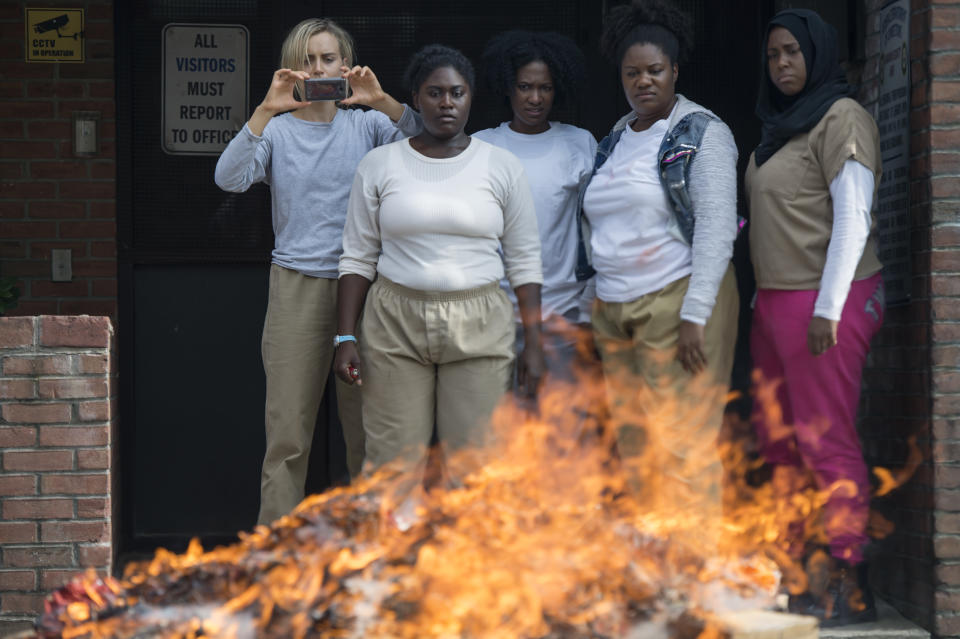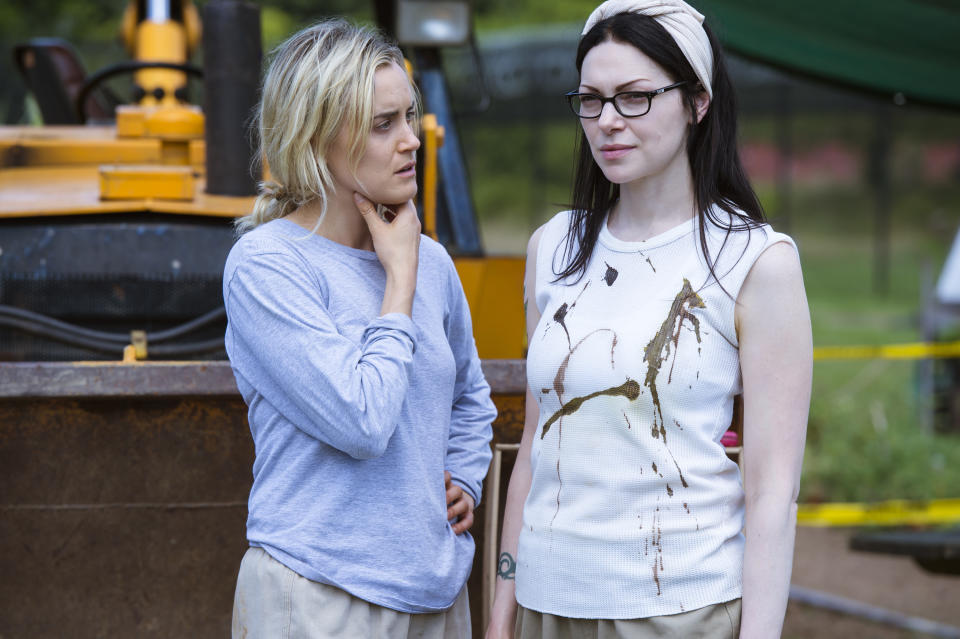Jenji Kohan Wishes She Could Have a "Do-Over" on 'Orange Is the New Black'


"It was horrible, horrible," says Jenji Kohan, the creator, showrunner, writer, and executive producer of Orange is the New Black. The death of Poussey Washington (Samira Wiley) at the end of the show's last season left fans reeling, but the writers, too. "You fall in love with these characters, so it's very painful [to kill them]," says Kohan. "It's also painful because we have some fantastic actors and you want these people to deliver your stuff.... I miss Samira and I miss Poussey."
Poussey's heartbreaking death made for a season finale that was both a tense cliffhanger and also a connection to cruelly tragic real-life deaths at the hands of law enforcement officials. The last we saw of the characters we've grown to love over four seasons of television, Daya (Dascha Polanco) was holding a gun to a guard's head, and her fellow inmates were ready to rise together against Litchfield Penitentiary staff. Season five of OITNB will pick up right there when Kohan's flagship series returns to Netflix today. All 13 episodes take place over the course of just three days, a bold storytelling choice that allows the drama to unfurl slowly.
Taking risks is nothing new for Kohan, and neither is crafting unique, long-running dramas focused on women. Equal parts tough and tender, loving and abrasive, Poussey was signature Kohan. These complex, nuanced female characters are a hallmark of her shows, all the way back to her first hit, Weeds. The show revolved around Nancy Botwin (Mary-Louise Parker), a single mother who turns to dealing pot after her husband passes away unexpectedly. The character-troubled, ambitious, but fiercely protective of her family-was unlike anyone else on TV. Weeds lasted eight seasons, earning Emmys and Golden Globes along the way, and thanks to its success, Kohan was able to drum up interest in her next project: OITNB.

Based on the memoir by Piper Kerman, the dramedy was set at a fictional prison in upstate New York filled with characters usually seen as background dressing on episodes of Law & Order: low-level drug runners, petty thieves, and addicts incapable of abstaining. Kohan took those characters and thrust them into the spotlight, creating another award-winning series and ushering in a new era of diverse, female-centric television along the way. "We are really diverse," says Selenis Leyva, who plays Gloria Mendoza, the tough-as-iron kitchen boss. "We're not just selling you that politically correct stuff. No, we are an extremely diverse cast, in front of the camera and behind it."
"We're telling good, strong, interesting stories about compelling characters-and that transcends politics in a certain sense."
For Kohan, that diversity simply reflects the audience, which helps people connect more deeply to the show, because they see their sister or neighbor or friend in its characters. "I think the television landscape has expanded," says Kohan. "It's smart business and should be normalized. It's weird when your viewership is diverse and what they're watching is not… This is what the new normal should be."
While Netflix doesn't release ratings, there are still a few ways to track the show's success. Critics loved the show from the beginning, and it seems that fans still do; it is the streaming service's most binge-watched show in Arizona, Alaska, Oklahoma, and Nebraska. That means the overwhelming addiction of Nicky Nichols (Natasha Lyonne), the heartbreaking struggles of Sophia Burset (Laverne Cox), Daya's impossible choices-all are beamed into the homes of so-called red states on a very regular basis. For her part, Kohan is not surprised by that. "I think there's something for everyone in the show," she says. "I think we're telling good, strong, interesting stories about compelling characters-and that transcends politics in a certain sense."

Still, Kohan wishes they had been able to address the changing political climate on the show (and who wouldn't love to hear Taystee's take on Trump's presidency?). "I wish we could have a do-over on season five," says Kohan. "There will be a lot of things that resonate with our current climate, but if I had I to do it all over again, I may have wanted to start from the beginning and say a little more about what's going on."
"It's weird when your viewership is diverse and what they're watching is not… This is what the new normal should be."
It may not explicitly address the political events of recent months, but OITNB's array of stories will still resonate with viewers across the political spectrum; it's about people, after all. "I hope [viewers] develop a feeling of familiarity with the 'other' and realize that people are similar in many ways-that [the show] normalizes heterogeneity," she says. "These people may not live among them, but they can recognize that other human beings have a human experience."
It's those relatable, deeply etched characters that draw viewers-and actors-to Kohan and her shows. "I was a fan of Jenji's from Weeds," says Adrienne C. Moore, who plays Cindy Tova Hayes, or "Black Cindy." "I knew that she could tell very gripping stories and she could create characters that had life and just popped off the page for you."

Uzo Aduba, who won an Emmy for her portrayal of Suzanne "Crazy Eyes" Warren, used similar language to describe the experience of reading Kohan's OITNB writing. "Remember when you were a kid and you would read those pop-up books and you'd turn the page and the castle would pop up? That was how it felt reading the script," she says. "It was almost like you could turn the page and, like, Red [Kate Mulgrew] or Nicky would pop up."
When the show began, back in 2013, the center of the story was clearly Piper Kerman (played by Taylor Schilling), a WASP-y blonde paying the price for her misspent youth. Because the show was based on Kerman's memoir, Piper was necessarily the focus, but Kohan wanted to use the show to tell more than just Piper's story. "It was always intended to be an ensemble show and we've grown our ensemble," says Kohan. Now, Piper's story may be woven into the show, but it's just one thread in the bigger tapestry. Having earned a 15-month-long sentence-give or take a few additional months for lying at trial-she is due out of jail any day now. "I think we've engineered a show that could go on in a lot of different ways without Piper," says Kohan. "I enjoy writing that character, but I think we can absolutely sustain a really interesting piece."
If anyone has proven the inventiveness and staying power needed to take a popular show someplace totally different, it's Kohan. It's impossible to see her getting complacent-especially as she drops OITNB viewers into the heart of a prison on the brink of an uprising. But she's earned the trust of her cast and her viewers. "We could go on forever and I don't mind it," says Leyva, laughing. "I think that's the beauty of what Jenji and the writers have created here."
You Might Also Like

